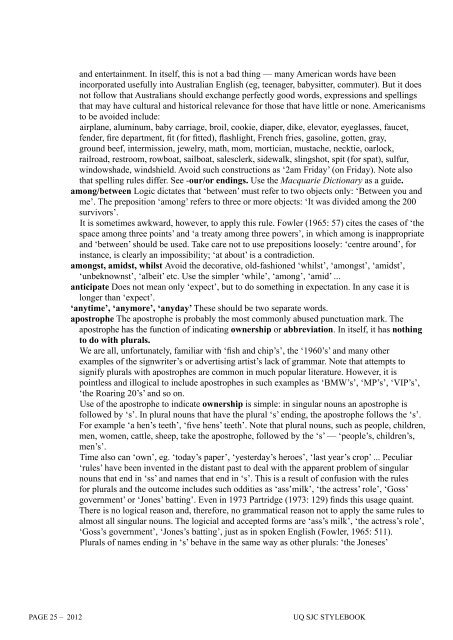Create successful ePaper yourself
Turn your PDF publications into a flip-book with our unique Google optimized e-Paper software.
<strong>and</strong> entertainment. In itself, this is not a bad thing — many American words have beenincorporated usefully into Australian English (eg, teenager, babysitter, commuter). But it doesnot follow that Australians should exchange perfectly good words, expressions <strong>and</strong> spellingsthat may have cultural <strong>and</strong> historical relevance for those that have little or none. Americanismsto be avoided include:airplane, aluminum, baby carriage, broil, cookie, diaper, dike, elevator, eyeglasses, faucet,fender, fire department, fit (for fitted), flashlight, French fries, gasoline, gotten, gray,ground beef, intermission, jewelry, math, mom, mortician, mustache, necktie, oarlock,railroad, restroom, rowboat, sailboat, salesclerk, sidewalk, slingshot, spit (for spat), sulfur,windowshade, windshield. Avoid such constructions as ‘2am Friday’ (on Friday). Note alsothat spelling rules differ. See -our/or endings. Use the Macquarie Dictionary as a <strong>guide</strong>.among/between Logic dictates that ‘between’ must refer to two objects only: ‘Between you <strong>and</strong>me’. The preposition ‘among’ refers to three or more objects: ‘It was divided among the 200survivors’.It is sometimes awkward, however, to apply this rule. Fowler (1965: 57) cites the cases of ‘thespace among three points’ <strong>and</strong> ‘a treaty among three powers’, in which among is inappropriate<strong>and</strong> ‘between’ should be used. Take care not to use prepositions loosely: ‘centre around’, forinstance, is clearly an impossibility; ‘at about’ is a contradiction.amongst, amidst, whilst Avoid the decorative, old-fashioned ‘whilst’, ‘amongst’, ‘amidst’,‘unbeknownst’, ‘albeit’ etc. Use the simpler ‘while’, ‘among’, ‘amid’ ...anticipate Does not mean only ‘expect’, but to do something in expectation. In any case it islonger than ‘expect’.‘anytime’, ‘anymore’, ‘anyday’ These should be two separate words.apostrophe The apostrophe is probably the most commonly abused punctuation mark. Theapostrophe has the function of indicating ownership or abbreviation. In itself, it has nothingto do with plurals.We are all, unfortunately, familiar with ‘fish <strong>and</strong> chip’s’, the ‘1960’s’ <strong>and</strong> many otherexamples of the signwriter’s or advertising artist’s lack of grammar. Note that attempts tosignify plurals with apostrophes are common in much popular literature. However, it ispointless <strong>and</strong> illogical to include apostrophes in such examples as ‘BMW’s’, ‘MP’s’, ‘VIP’s’,‘the Roaring 20’s’ <strong>and</strong> so on.Use of the apostrophe to indicate ownership is simple: in singular nouns an apostrophe isfollowed by ‘s’. In plural nouns that have the plural ‘s’ ending, the apostrophe follows the ‘s’.For example ‘a hen’s teeth’, ‘five hens’ teeth’. Note that plural nouns, such as people, children,men, women, cattle, sheep, take the apostrophe, followed by the ‘s’ — ‘people’s, children’s,men’s’.Time also can ‘own’, eg. ‘today’s paper’, ‘yesterday’s heroes’, ‘last year’s crop’ ... Peculiar‘rules’ have been invented in the distant past to deal with the apparent problem of singularnouns that end in ‘ss’ <strong>and</strong> names that end in ‘s’. This is a result of confusion with the rulesfor plurals <strong>and</strong> the outcome includes such oddities as ‘ass’milk’, ‘the actress’ role’, ‘Goss’government’ or ‘Jones’ batting’. Even in 1973 Partridge (1973: 129) finds this usage quaint.There is no logical reason <strong>and</strong>, therefore, no grammatical reason not to apply the same rules toalmost all singular nouns. The logicial <strong>and</strong> accepted forms are ‘ass’s milk’, ‘the actress’s role’,‘Goss’s government’, ‘Jones’s batting’, just as in spoken English (Fowler, 1965: 511).Plurals of names ending in ‘s’ behave in the same way as other plurals: ‘the Joneses’PAGE 25 – <strong>2012</strong>UQ <strong>SJC</strong> STYLEBOOK


